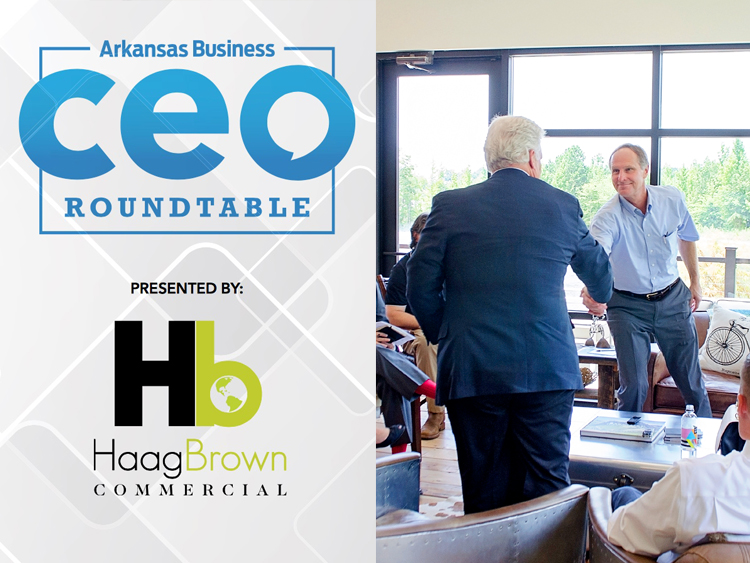
Business is good in Jonesboro these days, but due to the area’s critically low labor resources, not as good as it could be. Several leaders sat down with Arkansas Business for the first on-the-road installment of Executive Roundtable and discussed the city’s conundrum of too many jobs and not enough workers.
ARKANSAS BUSINESS: What are the pressing issues for Northeast Arkansas in the next 18 to 24 months?
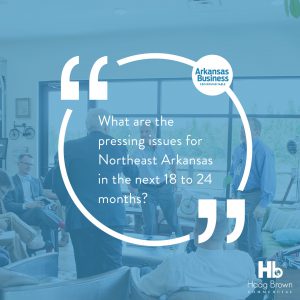 BOB WEST, Vice President of Corporate Development, Hytrol Conveyor Co., Inc.: We do a good job of attracting in- dustry. As a region we do a Linda talked about infrastructure, that’s what we do daily is analyze and invest in infrastructure to be ready for the growth to support economic development. We serve JAKE our customers and our RICE goal is to keep rates low and really good job of that. The problem is, we haven’t attracted the people to populate those industries. (Our company) manufactures conveyors. We have job openings from basic non-skilled labor all the way through the highly compensated brackets in just about any eld you can think of. We can hire 100, 120 more employees, today.
BOB WEST, Vice President of Corporate Development, Hytrol Conveyor Co., Inc.: We do a good job of attracting in- dustry. As a region we do a Linda talked about infrastructure, that’s what we do daily is analyze and invest in infrastructure to be ready for the growth to support economic development. We serve JAKE our customers and our RICE goal is to keep rates low and really good job of that. The problem is, we haven’t attracted the people to populate those industries. (Our company) manufactures conveyors. We have job openings from basic non-skilled labor all the way through the highly compensated brackets in just about any eld you can think of. We can hire 100, 120 more employees, today.
ALAN MORSE, President, Ritter Communications: The unemployment rate in Jonesboro and surrounding environs is at about 2.5 percent so the availability of skills, potential employees, is a real challenge. We recruit nationwide, but we love to take as many local people as we can get. We’ve still got 15 open positions right now. If there a was a message we could get out it would be there are jobs here, and there’s a good quality of life.
BRAD PARSONS, CEO, NEA Baptist Memorial Hospital: NEA Baptist Health System is unique because have clinical jobs and non-clinical jobs and we have very high wage earners and we have low wage earners. We’ve really been focused on recruitment and retention and training a lot of the lower wage earners around our community. It’s continual. I think to Alan’s point, a key takeaway right off the bat is, there are good jobs in northeast Arkansas. I think our community’s ability to get that word out, not only for where we are today, but also to continue to make our community more attractive for people to want to come and live here, are the critical issues between now and the next several years of growth.
ARKANSAS BUSINESS: How well does the quality of life message resonate these days?
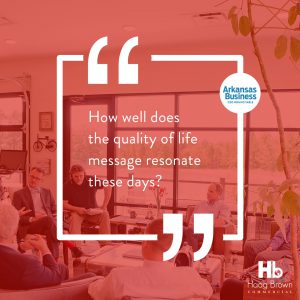 ALAN MORSE, President, Ritter Communications: We recruit nationally and a lot of times when we talk to people in other parts of the country we’ll tell them where we are and they’ll say ‘Thanks, but no thanks.’ So there is a need to publicize what we have here and all the good things about it more than we have. If we can convince them to come take a look, we close almost every time. It’s just getting them here. Sometimes it’s really challenging.
ALAN MORSE, President, Ritter Communications: We recruit nationally and a lot of times when we talk to people in other parts of the country we’ll tell them where we are and they’ll say ‘Thanks, but no thanks.’ So there is a need to publicize what we have here and all the good things about it more than we have. If we can convince them to come take a look, we close almost every time. It’s just getting them here. Sometimes it’s really challenging.
LINDA WOFFORD, President, Building Engines Inc.: I would say quality of life and infrastructure are, to me, the two biggest detriments that I see. If you’ve been here a long time, you can see all the improvements, but we still have a long way to go. We have perks but we don’t have connectivity, and we don’t have ease of access for some people. I see that as a major undertaking, and I think that’s what will help us get on the map for recruitment. And of course infrastructure. We have a lot of things on the forefront that we probably should have been address- ing 10 years ago but quite frankly, we’re at least 10 years behind where we should be. We all want to be caught up tomorrow and that’s just not going to happen.
JAKE RICE, Manager, City Water & Light: From the utility perspective we are a very asset-oriented business, a very asset-intensive business. Linda talked about infrastructure, that’s what we do daily is analyze and invest in infrastructure to be ready for the growth to support economic development. We serve our customers and our goal is to keep rates low and service reliable. We’re owned by the customers, so we’re not interested in making a rate for a shareholder. At the end of the day, if funds were unlimited, I don’t know that we would do anything differently. I think we would just continue to focus on our customers’ needs and try to meet those and do it in an economical manner.
ARKANSAS BUSINESS: What, specifically, do you see as infrastructure needs? Is there a wishlist to aid growth?
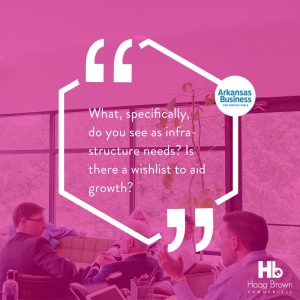 LINDA WOFFORD, President, Building Engines Inc.: I would invent some more land that we could buy for a technology and industrial park. We don’t have a lot of land to offer. We have a lot of businesses that look at us and would come here, but frankly our land resources are not what they once were, which is a good thing because that means that we’ve grown. But there’s very much a need for more land for a technology park.
LINDA WOFFORD, President, Building Engines Inc.: I would invent some more land that we could buy for a technology and industrial park. We don’t have a lot of land to offer. We have a lot of businesses that look at us and would come here, but frankly our land resources are not what they once were, which is a good thing because that means that we’ve grown. But there’s very much a need for more land for a technology park.
ALAN MORSE, President, Ritter Communications: I have three wishes on the infrastructure list. One is an interstate spur that would connect 550 with 55 some- where across northeast Arkansas. Second would be investing in a bike bridge that would connect North Culberhouse Road and South Culberhouse Road over 550. I think we have an absolute jewel in Craig- head Forest Park, and it’s very difficult to get there except by car. The third is more of a quality of life thing. We need something that puts Jonesboro on the map. I’d love to see a regional music and arts festival with a focus on down- town, give people a reason to come here and spend the weekend.
BRAD PARSONS, CEO, NEA Baptist Memorial Hospital: I think that’s important — to separate connectiveness as a community with some of the quality of life components. I think they can merge somewhat, but we need to think about connectivity in ways that the next generation of employees want to be connected. That’s not just a highway. There are other ways to be connected such as an eastern bike pass or an eastern corridor that is going to help not only future growth but also additional ways to navigate the city.
ARKANSAS BUSINESS: You mentioned earlier that Jonesboro has done a good job of attracting new business. What’s been the main draw?
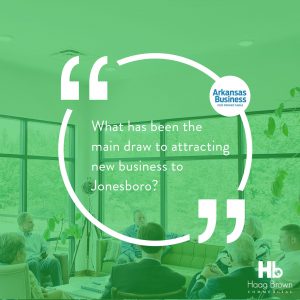 JAKE RICE, Manager, City Water & Light: From a utility perspective we have some of the lowest utility rates in the state and when you compare what our customers pay on average compared to what they pay on average to utilities across the nation, we save this community tens of millions of dollars annually. That can be invested back into the community for economic development and, we think, quality of life.
JAKE RICE, Manager, City Water & Light: From a utility perspective we have some of the lowest utility rates in the state and when you compare what our customers pay on average compared to what they pay on average to utilities across the nation, we save this community tens of millions of dollars annually. That can be invested back into the community for economic development and, we think, quality of life.
BRAD PARSONS, CEO, NEA Baptist Memorial Hospital: It’s one of the strengths of our community to have Arkansas State University. I can tell you in my world, having Arkansas State and their ability in the school of health-related professions to hear what our needs are and respond to those needs over time has really helped our sector grow tremendously. The new osteopathic medical school is here and made a big splash across the state and is huge for our community.
BOB WEST, Vice President of Corporate Development, Hytrol Conveyor Co., Inc.: I would say that there’s an unrecognized major center of manufacturing technology here that people just aren’t aware of. They think of the steel industry or agriculture industry, but there’s more to it. If people want a manufacturing career or technology career or IT career, this is a good area to come to. Cost of living is low. If you’ve got a family, it’s a great place to raise a family, too.
by Arkansas Business | October 1, 2018

